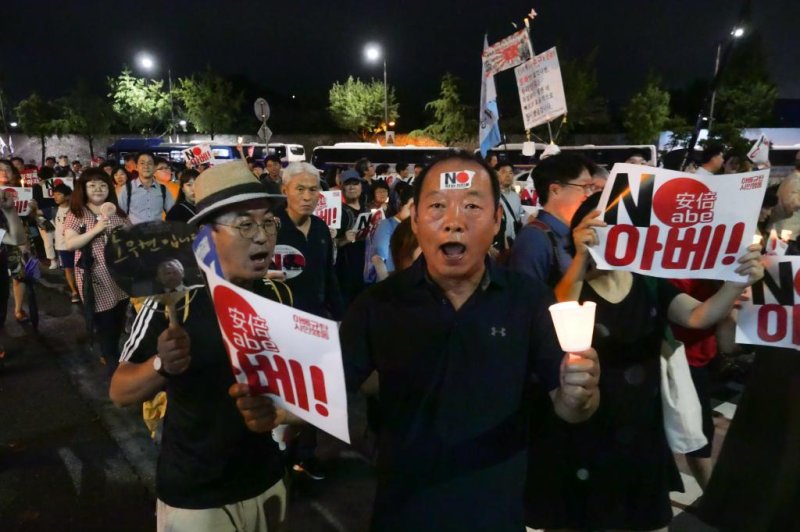1 of 9 | A group of protesters holding signs criticizing Japanese Prime Minister Shinzo Abe march in downtown Seoul on Thursday, South Korea's Liberation Day holiday. Photo by Thomas Maresca/UPI
SEOUL, Aug. 15 (UPI) -- Several thousand protesters took to the streets of downtown Seoul on Thursday, the 74th anniversary of Korea's liberation from Japan, calling on Japanese Prime Minister Shinzo Abe to apologize for his country's wartime treatment of Koreans and vowing to fight back on a trade and diplomatic dispute that has embroiled the neighboring countries.
Carrying banners that read "No Abe" and "Boycott Japan," demonstrators massed in a central square in Seoul on a rainy afternoon and held a candlelight march on surrounding streets as night fell, passing the Japanese Embassy along the way.
"We want to show the Abe administration that we're not happy with the decisions he has made," said Jun Gyu-kin, a 26-year-old student who joined the candlelight march. "I believe Japan is trying to suppress Korea with its trade policy."
Jun said that Abe should also personally apologize to Korean "comfort women," the euphemism for those who were forced into sexual slavery for Japanese troops in World War II brothels.
Tensions escalated between the two countries in July when Japan tightened export controls on three key materials that are vital to South Korea high-tech manufacturing industry. Tokyo later also removed South Korea from its "white list" of preferred trading partners, sparking retaliatory moves from Seoul and triggering a consumer-led boycott of Japanese products.
Japan cited security reasons for the trade restrictions, but South Korea sees the moves as retaliation for Supreme Court decisions last year that found Japanese companies must pay compensation to Korean victims of wartime forced labor.
"Everyone says Japan is our neighbor and we should have a good relationship, but they are invading us economically," said Kim Tae-hun, who was at the protest Thursday with an activist group called Candlelight Culture Solidarity. "They took us off their white list, so they're not a good neighbor anymore. We're going to have to do things on our own now."
Many at the Thursday's events made clear that their grievance was against the Japanese administration, not ordinary citizens.
"I am still being nice to the Japanese people, it's only the government of Abe that I'm against," said Yong Su-bin, 24. "I'm not buying anything from Japan or going to Japan. The Japanese government needs to say sorry."
Thousands of protesters from conservative groups were simultaneously holding their own demonstrations on Thursday in close proximity, calling for the ouster of South Korean President Moon Jae-in and pushing back against the anti-Japanese sentiment.
"President Moon government is using the Japan issue to gain political support," said 51-year-old Lee Soo-in. "Japan did terrible things to Korean people but that was in the past. The situation today is different from history. We need to keep the alliance between the U.S., Korea and Japan strong."
In a televised address for the Liberation Day holiday, Moon struck a conciliatory tone, speaking of cooperation with Japan and offering a vision of shared prosperity in East Asia.
"Better late than never: If Japan chooses the path of dialogue and cooperation, we will gladly join hands," Moon said. "We will strive with Japan to create an East Asia that engages in fair trade and cooperation."
Moon suggested the two countries could find a way to overcome a painful history of Japan's colonial occupation of Korea from 1910-45 that many still feel has not been resolved .
"Reflecting on the past does not mean clinging to the past but overcoming what had happened and moving toward the future," he said. "We hope that Japan will play a leading role together in facilitating peace and prosperity in East Asia while it contemplates a past that brought misfortune to its neighboring countries."















